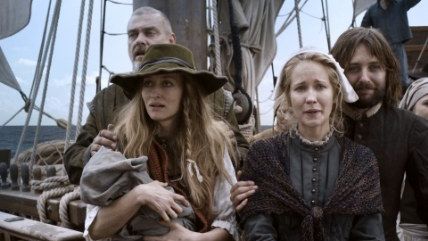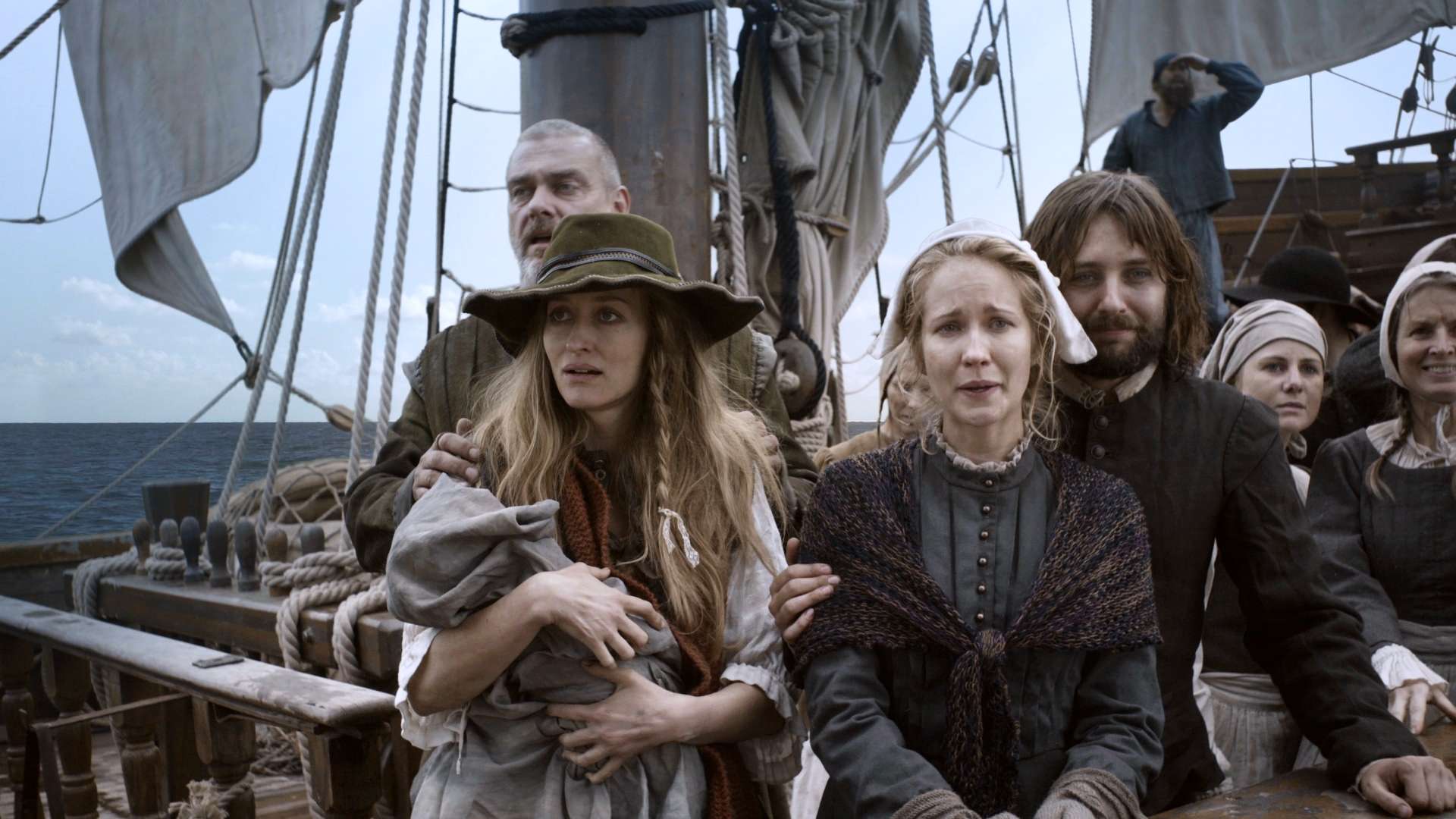Ditch the Fake Lovefest and Learn the Real Story of the First Thanksgiving
Saints & Strangers plays out the tense political negotiations.


Saints & Strangers. National Geographic Channel. Sunday, November 22, 9 p.m.
As a little kid, skeptical of the efficacy of negotiations—they certainly never got me pony for Christmas or even a 15-minute extension on my bedtime—and addicted to the flying lead of TV shows like Wagon Train and Boots And Saddles, I found the Thanksgiving origin stories we learned at school about peaceful pilgrims and friendly Indians inutterably boring. It turns out my childhood ennui was entirely unnecessary. As Saints & Strangers proves, that first Thanksgiving was anything but boring.
This engrossing four-hour miniseries (the second part airs Nov. 23) portrays the tense, halting negotiations between the pilgrims who in 1620 landed in what would become Plymouth, Massachusetts, and the Indians they found there for what they really were: a tense geopolitical drama full of espionage, threats, power politics and high-stakes game theory.
It is also a sobering lesson in the difficulties of negotiating across deep mutual suspicions and vast cultural divides. The names and historical details may be quite different, but Saints & Strangers has some clear—and dismaying—resonance at a time when the West and the Islamic world are at one another's throats.
Saints & Strangers takes its title from a fact rarely mentioned in standard Thanksgiving mythology: Only about a third of the 102 passengers aboard the Mayflower—a converted cargo ship that one of the ship's officers refers to as "a filthy stinking kennel"—were religious pilgrims fleeing persecution in Europe. Another third or so—the "strangers," as the pilgrims smugly referred to them—were adventurers and refugees seeking escape from the nether regions of the British economy, recruited by the trading company that underwrote the voyage. (The rest were indentured servants.) The passage of the Mayflower was at least as much an economic venture as quest for religious liberty.
The differing agendas of the Mayflower voyagers quickly create schisms when the ship and its starving, scurvy-ridden passengers are forced to land in an uncharted region hundreds of miles north of its intended destination in Virginia. "They came for fortune," observes William Bradford (Vincent Kartheiser, Mad Men), the introspective pilgrim who will become the colony's first governor. "We came for God."
They clash constantly, over everything from whether the priority should be building a church or planting fields to the practical conundrums created at the intersection of predestination and free will: We wouldn't have found the hiding place of the local Indians' seed corn if God hadn't intended it. But does that mean God intended us to steal it? And does theology matter when we're starving? "There were some things God neglected to mention," concedes Bradford.
Chief among them are those Indians, whose presence cuts across all economic and religious divides to split the pilgrims into hawks and doves. The same is true on the other side of the forest, where the Pokanoket leader Massasoit (Raoul Trujillo, Salem) convenes a tribal counsel. "What should I do?" he asks. "Slaughter them," counsels one Cheney-esque lieutenant.
In Saints & Strangers, as in real geopolitics, expressions of good will, even when sincere, are never enough: The Indians, from previous bitter experience with smallpox, know the British, however innocently, are walking biological-warfare weapons of mass destruction, whether they intend it or not.
And the line between diplomacy and espionage is thin. When the Indians send an English-speaking emissary to talk peace, some of the settlers are encouraged. Others recoil from what they view as an intelligence mission targeted on their supplies. "You see it as breaking bread," barks the roughneck Stephen Hopkins (Ray Stevenson, Rome), "when actually he was sampling the neediness of our sustenance." Inevitably, the Indian who does the most to bring the two sides together—a bilingual former slave of the British, Squanto (Lalani Queypo), who teaches the pilgrims the local secrets of agriculture—falls under suspicion from both.
Eventually, as you know if you've been eating Thanksgiving turkey all these years, the two sides work out a treaty. But Saints & Strangers characterizes it as less a triumph of human decency than of Kissingerian realpolitik. Massasoit sees the English as a buffer against his Indian enemies and even helps the settlers organize a savage act of treachery to decapitate the leadership of rival tribes. The English see their new Indian allies not as equals but as dispensable pawns in a long game. "We shall use them, but never shall we trust them," says one settler.
Even so, there are moments of touching transformation among the characters in Saints & Sinners, none more so than that of the bluff Hopkins, who starts with a purely sanguinary view of the Indians he calls savages, but by the end confesses: "Savagery is a plague that haunts all of us—perhaps even me." Stevenson's portrayal of Hopkins' journey from ruffian racism to live-and-let-live affability is thoroughly enjoyable, all the more so if you know that in real life, Hopkins eventually opened Massachusetts' most stubbornly anti-Puritan tavern and was forever being fined for serving whiskey on the Sabbath.
Editor's Note: As of February 29, 2024, commenting privileges on reason.com posts are limited to Reason Plus subscribers. Past commenters are grandfathered in for a temporary period. Subscribe here to preserve your ability to comment. Your Reason Plus subscription also gives you an ad-free version of reason.com, along with full access to the digital edition and archives of Reason magazine. We request that comments be civil and on-topic. We do not moderate or assume any responsibility for comments, which are owned by the readers who post them. Comments do not represent the views of reason.com or Reason Foundation. We reserve the right to delete any comment and ban commenters for any reason at any time. Comments may only be edited within 5 minutes of posting. Report abuses.
Please to post comments


Okay, I'll be watching in my Priscilla Mullins attire. Although, I pretty much know this story already since I am a Mayflower descendant (and a Jamestown Colony descendant, but I don't want to brag).
I too am a Mayflower descendant. I was all puffed up and like, until I found wikipedia says
Although the reference they provide only says
and I had previously found something saying 10% of Americans are Mayflower descendants.
10 million ?
wow
Those Puritans were some prolific sexually oppresed people, huh ?
400 years / 20 generations does that. I have read other claims about most people now being related to Caesar etc, but that probably applies to Europeans more than Chinese, for instance.
I'm making $86 an hour working from home. I was shocked when my neighbour told me she was averaging $95 but I see how it works now.I feel so much freedom now that I'm my own boss.go to this site home tab for more detai....
http://www.4cyberworks.com
Yea, but are you a descendant of the pilgrims ?
Welp...so much for that bit of braggery. Maybe I can find something else to brag about...
Those who were fleeing religious persecution became that which they fled once they established dominance. The Puritians even went so far as to hang several Quakers for refusing to doff their hats to the Puritian magistrates.
Pacifists are free riders on the Train of Liberty.
OneOut circa 2015
The Puritans didn't *claim* they wanted religious freedom.
They wanted a Godly commonwealth, and England didn't cut it - the English form of Protestantism was just too Catholic. So off they went to Massachusetts and set up a church under the Congregationalist form, and if you weren't of the Elect, you couldn't join - or vote either.
The ministers didn't hold government posts, any more than Calvin did in Geneva, but like Calvin they were highly influential over the government.
And the Puritans believed God would be angry not only if they sinned, but if they *permitted* sin to exist within their jurisdiction - whether it be Sunday whiskey, religious dissent, witchcraft, Christmas, etc.
I prefer A History Channel Thanksgiving. I am also thankful the Puritans wandered off course. If only they could have been contained.
This does seem like a very interesting program! But I can't help noting Garvin's observations concerning the difficulties of communicating across different cultures and the friction and violence that result from such culture clash. Mass immigration turned out pretty badly for the Indians, didn't it? So why are Reason's writers so set on promoting it for the West today?
This "real" story seems to illustrate why a policy of limited emigration access might be prudent.
Google pay 97$ per hour my last pay check was $8500 working 1o hours a week online. My younger brother friend has been averaging 12k for months now and he works about 22 hours a week. I cant believe how easy it was once I tried it out.
This is wha- I do...... ?????? http://www.buzznews99.com
the "strangers," as the pilgrims smugly referred to them?were adventurers and refugees seeking escape from the nether regions of the British economy
Add Garvin to the long list of yokeltarian pants-shitters. No one on the Mayflower was designated as a refugee by the U.N.
What a spin. But the article never gave a FACT to contradict the narrative, and ignores a wise old Arab tale about the very subject.
Remember the camel that begged the master to let him warm just his little nose inside the tent?
Google pay 97$ per hour my last pay check was $8500 working 1o hours a week online. My younger brother friend has been averaging 12k for months now and he works about 22 hours a week. I cant believe how easy it was once I tried it out.
This is wha- I do...... ?????? http://www.buzznews99.com
The Google spammers are less irritating than those homophobic idiots who keep wanting to spin this into anti-refugee rhetoric. Geez! Give it a rest already. You anti-refugee idiots already have too many stupid, reactionary politicians on your side. Let the pro-refugee side at least get their say, even as they don't get their way.